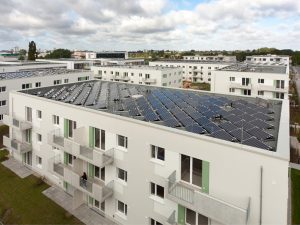 The Federal Cabinet today adopted the so-called Easter Package at the proposal of Vice Chancellor and Federal Minister for Economic Affairs and Climate Protection Robert Habeck. This is the largest amendment to energy policy legislation in decades. The Easter Package comprehensively amends various energy laws in order to accelerate and consistently drive forward the expansion of renewable energies.
The Federal Cabinet today adopted the so-called Easter Package at the proposal of Vice Chancellor and Federal Minister for Economic Affairs and Climate Protection Robert Habeck. This is the largest amendment to energy policy legislation in decades. The Easter Package comprehensively amends various energy laws in order to accelerate and consistently drive forward the expansion of renewable energies.
Robert Habeck on this: "The Easter package is the accelerator for the expansion of renewable energies. We will almost double the share of renewable energies in gross electricity consumption within less than a decade. We are tripling the speed of renewable expansion - on water, on land and on the roof. In the future, renewable energies will be in the public interest and serve public security. This is crucial to increase the pace. Overall, with the Easter Package we are creating the conditions for Germany's energy security and energy sovereignty. At the same time, it lays the foundations for Germany to become climate neutral."
Habeck further explained: "The Easter Package is part of our agenda and has been worked on under high pressure over the past months. It has now taken on a double urgency in view of Russia's war of aggression on Ukraine, which is contrary to international law. On the one hand, the climate crisis is coming to a head. On the other hand, Russia's invasion shows how important it is to get out of fossil fuels and to consistently push ahead with the expansion of renewables. We are doing this courageously and consistently.
The Easter package adopted today by the Federal Cabinet will now be forwarded to the German Bundestag and will enter the parliamentary legislative process in a next step. It is an article law, which comprises the following individual laws on more than 500 pages:
- the Renewable Energy Sources Act (EEG),
- the Wind Energy at Sea Act (WindSeeG),
- the Energy Industry Act (EnWG),
- the Federal Requirements Plan Act (BBPlG),
- The Transmission Grid Expansion Acceleration Act (NABEG)
- other laws and ordinances in energy law.
What concrete measures does the Easter package contain?
- At the heart of the package is the principle that the use of renewable energies is in the overriding public interest and serves public safety. The expansion of renewable energies on land and at sea is raised to a completely new level. By 2030, at least 80 percent of Germany's gross electricity consumption is to be sourced from renewables.
- Extensive measures are being taken to promote the expansion of renewable energy. For example, new areas are being made available for the expansion of photovoltaics, the participation of municipalities in onshore wind and photovoltaics is being expanded, low-wind locations are being developed more intensively and the framework conditions for the expansion of photovoltaic roof systems are being improved.
- In future, the expansion of offshore wind energy is to be based on two equal pillars. In addition to the tendering of areas that have already been pre-surveyed, areas that have not yet been pre-surveyed will also be tendered in future.
- The expansion of renewable energies and the grids will be accelerated by removing obstacles and streamlining planning and approval procedures.
- The federal requirement plan for the expansion of the transmission grids is being updated and new projects are being included so that the grids can keep pace with the expansion of renewable energies.
- With the abolition of the EEGAt the same time, the regulations for self-consumption and the privileged treatment of industry are enormously simplified and a major contribution is made to reducing the bureaucracy of energy law.
- The rights of end customers and the Federal Network Agency's supervisory options over energy suppliers are strengthened in order to protect electricity and gas consumers even better in the future.
An overview paper on the Easter Package and the draft laws can be found at here.
Keywords: DE-News, Renewable, Funding, Climate protection, Tenant electricity, PV, PlusEnergy house/settlement, Solar thermal, Environmental policy








